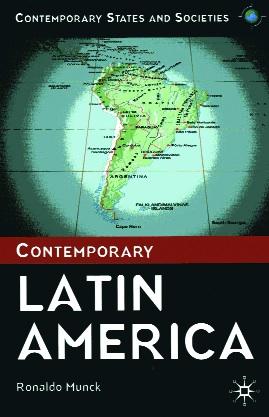Contemporary Latin America
Published in 20th-century / Contemporary History, Book Reviews, Issue 4 (Jul/Aug 2008), Reviews, Volume 16 Contemporary Latin America
Contemporary Latin America
Ronaldo Munck
(Palgrave McMillan, £52.50)
ISBN 9780230514942
Given the rapid changes taking place in the continent and wider developments in the global political economy, attempting to capture the reality of contemporary Latin America is a challenging task. The end of the Cold War and the rise of China have combined to create a new environment for the nation states of Latin America. Hemispheric relations remain important, but south of the isthmus the United States is no longer the dominant force. Regional geopolitics are in flux and it is difficult to be confident about any prognosis. The jury is still out on the sustainability of the regional trading market, Mercosur, and the consequences of Brazil’s growing ambitions remain unclear.
All this is in contrast to the virtual stasis in the inequalities between Latin America’s social classes. Ronaldo Munck deftly illustrates the startling income differentials that continue despite the recent shift to the Left experienced in many countries. In such a diverse region, this is one feature that is common across the continent. In Brazil, Bolivia and Chile the richest 10 per cent still account for more than 40 per cent of national income. Relative poverty is a major challenge in Latin America but, as Munck argues, it is not useful to view the region simply as underdeveloped or developing. The reality is more complex; if development is measured in terms of industrialisation, Latin America sits plainly on the global average. In a continent scarred by serious social problems, however, the State in Latin America is underdeveloped. Across the region, only 20 per cent of GDP is spent by central government, compared to an average of 41 per cent in developed countries. Thus the options available to politicians in tackling inequalities are limited. The consequences of this are presented in the chapter entitled ‘Social Patterns’, in which Latin America is identified as the most unequal region in the world, with 44 per cent of the population living in poverty. Even so, in his chapter on the politics of the region Munck gives a largely positive assessment of Bachelet in Chile, Kirchner in Argentina and Lula da Silva in Brazil. In the case of the latter, the positive assessment is tempered by the observation that his Workers’ Party has not proved to be the radical force that many of its supporters had expected.
In his second chapter Munck provides the reader with some historical context. Interestingly, he highlights the tendency of local élites to see problems as internal and solutions as external. The post-independence political and cultural élites saw themselves as engaged in a battle against the barbarity of the local populations. In a chapter on the region’s culture Munck defines this tendency, captured in the writings of the Argentine Domingo Sarmiento, as an important component of that culture. In the nineteenth and early twentieth centuries, the models for development were European, underwritten by a positivist philosophy that stressed the ideas of science and progress. Both socially and culturally, the identification of the local with backwardness and the European with progress has had profound consequences. In part, it explains the chronic internal conflict that exists in Latin America, and the resulting violence. At the same time it is worth reflecting on the fact that this split between the indigenous and the European has had profound psychological consequences. Among mestizo populations the dominant narratives on race are effectively reflected back to them each morning in the mirrors of their bathrooms and bedrooms.
Overall, the book succeeds in providing a clear and thoughtful introduction to Latin America. If there is one criticism, it is the relative lack of attention paid to the economy, and in particular to the repeated financial crises that have savaged the region. These crises have had a profound effect on social cohesion, governance and relations with the wider world. In his conclusion Munck addresses the need to establish a healthier balance between the State and markets, and identifies the regulatory function as crucial in this regard. He argues that states have to tackle the legacy of the neo-liberal reforms of the last couple of decades. Given the move to the Left, the more benign international environment and favourable commodity prices, this may be a historic opportunity for contemporary Latin America.
Martin Mullins is a lecturer at the Kemmy Business School, University of Limerick.
















